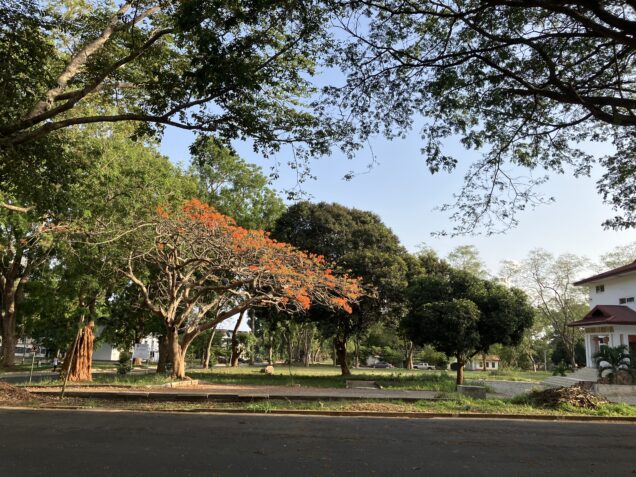News
Exciting things are always afoot.
Room 131 open for business!
The LiSLab space (Room 131) was designed for
- in-person fieldwork interviews with one or two native speaker consultants
- remote fieldwork sessions using a laptop
- traditional psychology-style experiments using in-person subjects and computer screens
- private study or work related to LiSLab research objectives
- small-group meetings related to LiSLab research objectives (3 chairs)
If you would like to use this room for any of these purposes, please email Prof. Coppock at ecoppock@bu.edu.

Coppock/Hill/Myler present on Indonesian reciprocals at LSA
A poster entitled "Voice-mismatch reciprocals in Indonesian and binary predicate conjunction" by Elizabeth Coppock, Romi Hill and Neil Myler will be presented at the LSA Annual Meeting in New Orleans, LA, January 2026.
Abstract:
Our paper focuses on a phenomenon in Indonesian we call voice-mismatch reciprocals. For example, Ani dan Ani jimpit-men-jimpit means `Ani and Ana pinched each other'. This construction may appear at first to be one of Indonesian's many reduplication constructions, as Mistica et al. (2009) argue. We argue instead that this construction involves coordination, in agreement with Udayana et al. (2024). We argue in particular that it is binary predicates that are coordinated, in the manner that Staroverov (2007) envisions for syndetic coordination of relational nouns, as in brother and sister. We show that the binary coordination analysis offers a principled route to the reciprocal reading, relying only on general mechanisms, one which is compatible with the argument-selection behavior of the verbs involved.
Talk on numeral reduplication in Newar at University of Buenos Aires
A talk entitled "Unifying dependent and independent numeral reduplication in Newar" was presented by Elizabeth Coppock at the University of Buenos Aires, December 17, 2025.
Abstract: Reduplicated numerals in Newar (to which matching numeral classifiers affix), as in cha-mha cha-mha nyaa `one-clf.anim one clf.anim fish', like reduplicated numerals in languages where they have already been studied, can serve as dependent indefinites, introducing existential quantification under the scope of a licensing universal. But they have another use as well, one that could be called independent, as it does not rely on the presence of a distinct distributive operator in the sentence. The independent uses come with a universal interpretation. So reduplicated numerals in Newar have both dependent-indefinite and independent-universal uses. I propose a way of unifying them using sequences. The analysis offers a new lens on `simultaneous distributivity', a phenomenon in which one and the same element marks both the share and the key.
Slides available here.
Professor Coppock presents at Sinn und Bedeutung and U Chicago
Sinn und Bedeutung 30 was held at the University of Frankfurt in September 2025. Professor Coppock presented on Friday.
Title: Unifying arithmetic and mereological division.
Abstract here.
A longer version of the talk was presented at the University of Chicago in October. Slides here.
New paper on distributivity via reduplication in Mandinka!
The Proceedings of Triple A 10 have just been published, including a contribution by BU PhD student Ousmane Cisse and Prof. Elizabeth Coppock entitled "Reduplicated distributivity in Mandinka".
Here is a PDF of the published paper, and here is the video of our talk:
Cite as: Cisse, Ousmane and Elizabeth Coppock (2024). Reduplicated Distributivity in Mandinka. In Jeanne Lecavelier, Niklas Geick, Mira Grubic, Prarthanaa Bharadwaj and Malte Zimmermann (eds.), Proceedings of Triple A 10 (2023), 75--89.
Abstract
Reduplication is commonly exhibited by markers of distributivity. Although distributivity markers can either mark the key (as determiner each does, as in each child saw a lion) or the share (as with binominal each, as in the boys saw a lion each), it has been conjectured that distributivity markers formed through reduplication are always markers of the share, rather than the key. Here we discuss a case that challenges but ultimately vindicates this conjecture. In Mandinka (spoken in Senegambia), reduplicating a nominal with interposition of the morpheme -woo- gives rise to a distributive reading. We investigated the semantics of the X-woo-X construction and found that it behaves as a key-marker, but also as a share-marker. We take these findings to support an analysis on which X-woo-X signals 'simultaneous distributivity', simultaneously marking both key and share.
LiSLab represents at Experiments in Linguistic Meaning 3
Elizabeth Coppock, David Beaver and Emily Richardson made a contribution to the third Experiments in Linguistic Meaning conference entitled "Ordering is not ranking: A study of ordinals vs. degree modifiers in nested definites".
The slides are here.
Prof. Coppock presents in Budapest
Prof. Coppock gave a talk at the Hungarian Research Center for Linguistics in May, entitled "Division and distributivity: The case of Hungarian -nként".
The slides are here.

Boston University represents at ACAL 55!
BU linguistics came in force to ACAL 55 in May 2024 at McGill University in Montreal, Canada, contributing four talks:
- Andre Batchelder-Schwab and Chris Collins: "Classification of Tschila"
- Nairan Wu: "Remnant movement and word order constraints in Khoekhoe (Nama-Damara)"
- Jackson Kellogg and Jonathan Barnes: "Word- and phrase-level prosodic structure in Amharic"
- Ying Gong and Elizabeth Coppock: "No need for the Degree Abstraction Parameter in Mooré" (slides)

Professor Coppock presents in Ghana
Professor Coppock gave an invited talk at the University of Ghana in Accra, for a meeting of a German-based international network of researchers on definiteness. The focus of the workshop was on definiteness-marking and clausal determiners in Akan and other languages of West Africa. For bare nouns in Akan vs. ones marked by the definiteness marker nó, Coppock advocated for a fresh approach, forgetting about the familiarity vs. uniqueness distinction, inspired by recent work on bare nouns in Mandarin.
The handout is available here.
There were many interesting talks. Samson Korsah is pictured here leading a discussion on Gã.

Among the discoveries of the trip was that there is a stunningly beautiful tree outside the linguistics department at the University of Ghana:

Gong & Coppock publish in Natural Language Semantics!
Ying Gong and Elizabeth Coppock have published an article in Natural Language Semantics showing the existence of degree abstraction in Mandarin. Could degree abstraction actually be a universal feature of natural language?? Even if not, we have some rock-solid arguments that degree abstraction exists in Mandarin despite previous claims to the contrary.
Officially published version at Natural Language Semantics here: https://link.springer.com/article/10.1007/s11050-023-09217-w
Here is a link to the accepted manuscript (no paywall).